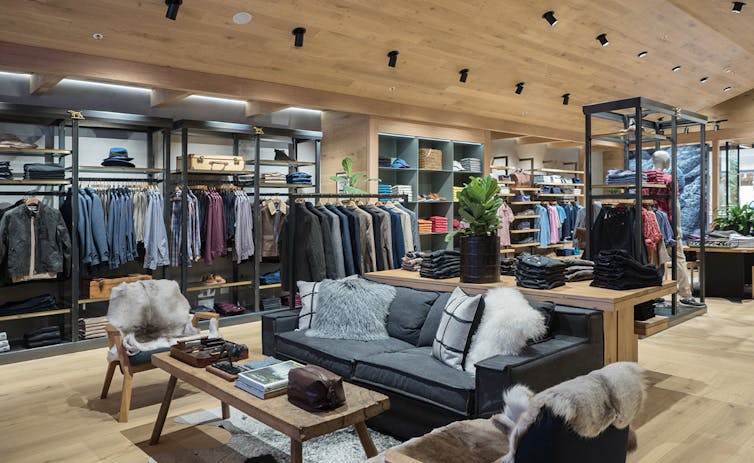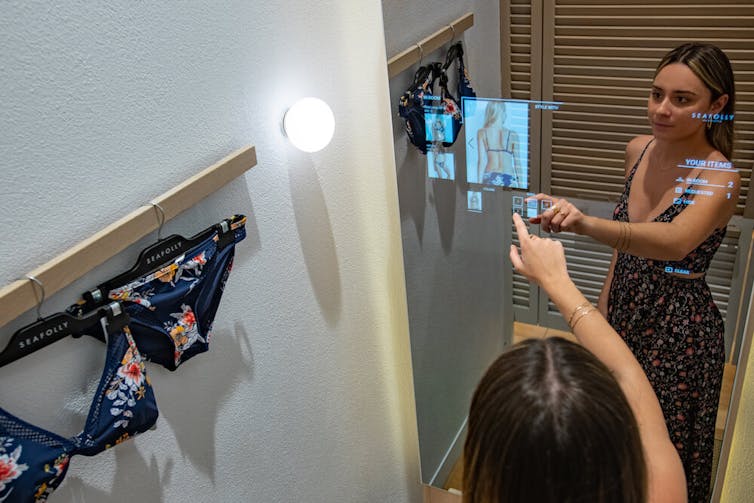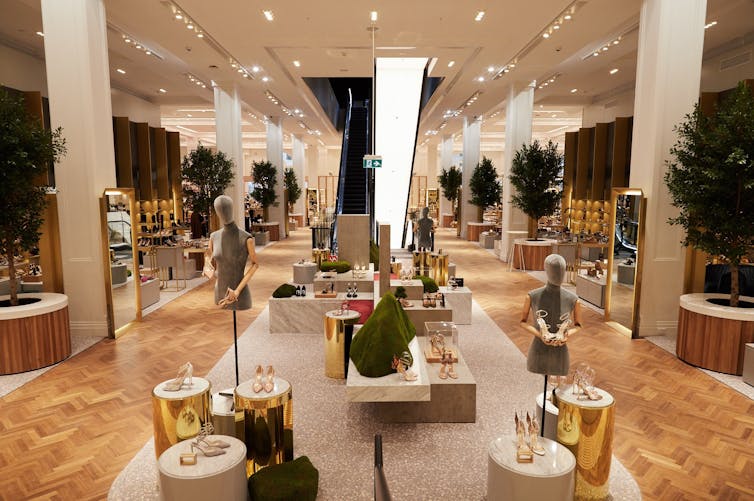three tricks up retailers' sleeves to lure you back to physical shops
- Written by Eloise Zoppos, Senior Research Consultant, Monash University
Bricks-and-mortar retail stores are under intense pressure from online competition. Feeling the most heat are clothes shops and department stores.
This year David Jones’s profit halved, to A$64 million. Myer declared a “disappointing” A$486 million loss[1]. German giant Esprit, whose global sales have fallen 40% in four years, has shuttered its Australian operations[2]. The US-based Gap closed its last Australian store[3] back in February. Other brands to have collapsed include Metalicus, Oroton, Marcs, David Lawrence and Pumpkin Patch.
What to do?
One answer is to invest in and enhance those aspects of the shopping experience that online retailers just can’t provide.
To do so department stores and clothing retailers are drawing on consumer behaviour and psychological research to make themselves more appealing – sometimes without shoppers even consciously realising it.
Here are three of the most significant strategies.
Home is where your heart is
Shopping from home is comfortable. You can do it in your time. You feel no pressure to hurry up and buy something. You can do it in your pyjamas.
To compete against the home shopping experience, retailers are exploring how to make you feel more at home in their stores. Tactics involve evoking sensory familiarity through furnishings, lighting and even scents.
Men’s clothing retailer Rodd & Gunn is taking the homeliness vibe to its logical extreme, with shop fit-outs that mimic an actual home.
 Rodd & Gunn’s ‘experiential’ retail store in Chadstone, Melbourne.
Rodd and Gunn blog
Rodd & Gunn’s ‘experiential’ retail store in Chadstone, Melbourne.
Rodd and Gunn blog
The picture above shows Rodd & Gunn’s “experiential store[4]” in Chadstone, Melbourne. There’s a slanted wood-panelled ceiling to evoke a real house roof. In the centre of the shop floor is a “living room” space with sofa, armchairs and a coffee table. Artworks hang on the walls. It’s all intended to make you feel as relaxed (almost) as you would in your own home.
This approach reflects the research that shows how familiar design elements[5] help make shoppers feel comfortable. Colour and music choices apparently don’t make much difference, but layout and other sensory experiences do.
Familiar scents, for example, can affect your decision to go into a store, how long you stay and ultimately how much you spend. They are particularly effective when they complement[6] the brand, such as the faint smell of wood in a hardware store or a more herbal scent in a wellness store.
You want space, but not too much
What can make or break your experience in a shop is how the staff treat you. As Sarah Alhouti and her colleagues[7] have put it, there’s a thin line between love and hate of attention.
An overly attentive salesperson can be perceived as desperate, pushy or aggressive and drive you away[8]. Too little attention, on the other hand, can leave you feeling ignored, unwanted and unworthy[9], with the same result.
With the Goldilocks zone being different for different people, retailers are turning to technology to help get the attention levels right.
For example, Australia’s largest swimwear label, Seafolly, is trying out an interactive mirror[10] in the fitting room of its Bondi Junction store in Sydney.
 The interactive mirror in Seafolly’s Bondi Junction store.
Seafolly
The interactive mirror in Seafolly’s Bondi Junction store.
Seafolly
It allows the customer to message staff directly from the changing room for assistance only if, and when, they decide they need it.
You’re so special
Shopping online is highly convenient but it doesn’t necessarily make you feel special.
Some bricks-and-mortar retailers are positioning themselves at the premium end of the shopping market by appealing to the human desire to be pampered. It makes sense to invest in the “VIP experience”, because now every customer they get is very important.
Creating the VIP experience extends from personal greetings to champagne and caviar bars.
Department store David Jones[11] has embraced this trend as part of the A$200 million redevelopment of its Sydney premises.
Its revamped shoe floor – the largest shoe store in Australia – includes “shoe concierges” to greet and guide you and specialist shoe fitters recruited from around the world. And yes, there’s also a champagne bar.
 David Jones’ new ‘Level 7’ shoe floor in Sydney.
David Jones media release
David Jones’ new ‘Level 7’ shoe floor in Sydney.
David Jones media release
Such experiences meet the desire for a “luxe” experience[12] without the luxury price tag. Research has found that even the simple act of just being welcomed at the entrance of a store can influence how your perceive service quality[13] as well as customer satisfaction and store loyalty[14].
Whether such strategies can save bricks-and-mortar stores remains to be seen.
In the meantime, champagne anyone?
References
- ^ A$486 million loss (www.abc.net.au)
- ^ its Australian operations (www.ibisworld.com)
- ^ last Australian store (www.news.com.au)
- ^ experiential store (www.insideretail.com.au)
- ^ familiar design elements (www.sciencedirect.com)
- ^ complement (www.sciencedirect.com)
- ^ Sarah Alhouti and her colleagues (www.researchgate.net)
- ^ drive you away (www.sciencedirect.com)
- ^ ignored, unwanted and unworthy (www.jstor.org)
- ^ interactive mirror (www.ragtrader.com.au)
- ^ David Jones (www.smh.com.au)
- ^ a “luxe” experience (www.forbes.com)
- ^ perceive service quality (www.sciencedirect.com)
- ^ customer satisfaction and store loyalty (www.researchgate.net)
Authors: Eloise Zoppos, Senior Research Consultant, Monash University







